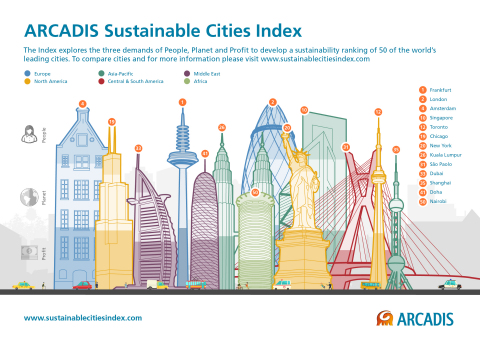HIGHLANDS RANCH, Colo.--(BUSINESS WIRE)--The largest U.S. cities – New York, Los Angeles and Chicago – score best in economic factors but are hindered by poor transportation infrastructure, lack of green spaces and diminishing affordable housing, according to the inaugural Sustainable Cities Index by ARCADIS, the leading global natural and built asset design and consultancy firm.
This first-of-its-kind sustainability index, which was conducted by the UK-based Centre for Economics and Business Research (CEBR), explores three key demands – social (People), environmental (Planet) and economic (Profit) – to develop a ranking of 50 of the world’s leading cities based on 20 key indicators.
Experts agree a sustainable city should meet the needs of the present without sacrificing the ability of future generations to meet their own needs. The 2015 index finds that while no utopian city exists, city leaders are managing a complex balancing act of generating strong financial returns and maintaining an attractive place for people to live and work while limiting damage to the environment.
The full rankings can be viewed at www.sustainablecitiesindex.com
U.S. and Canada: profit over planet
None of the North
American cities studied makes it into the Index’s top 10, with Toronto
ranking the highest overall at 12th place. Boston and Chicago (ranked
No. 15 and 19 respectively) are the most sustainable of all U.S. cities
included in the ranking. This is compared to Frankfort, London and
Copenhagen ranking in the top three, respectively.
Here are the worldwide sustainability rankings of the nine U.S. cities
profiled in the index:
#15 – Boston
#19 – Chicago
#20 –
New York
#21 – Houston
#22 – Philadelphia
#25 –
Washington, D.C.
#27 – San Francisco
#28 – Los Angeles
#29
– Dallas
Cities in the U.S. and Canada perform significantly better on Profit factors than in the other sub-indices, the result of strong performance on GDP per capita and the ease of doing business. But the cost of doing business in the U.S. is high, tempering the strong performance delivered in most Profit factors measured. San Francisco ranked the highest in this category at 7th place, while all U.S. cities studied appear in the top half of the Profit sub-index.
However, while greater income allows some cities to improve their rankings, higher economic development does not guarantee greater sustainability. Every North American city in the Index sits in the bottom half of the rankings on carbon emissions (Los Angeles ranked last among the U.S. cities). This is the same for cities in the Middle East.
John Batten, global cities director at ARCADIS, says, “City leaders need to find ways to balance the demands of generating strong financial returns, being an attractive place for people to live and work in, while also limiting their impact on the environment.”
People factor considered last
Approximately half of the
world’s population now lives in cities and urban areas. Yet, across the
world, the index finds cities are more sustainable for Profit and Planet
purposes than they are for People factors.
Many of the world’s economic powerhouses are becoming less affordable for their citizens, with the cost of property in New York, London, Paris, Tokyo and Hong Kong penalizing their rankings. There is also a trade-off globally between strong education and poor work-life balance, particularly demonstrated in Hong Kong, Seoul and New York.
Batten continues, “To truly understand how sustainable a city is, we must understand how well it balances the triple bottom line of People, Planet and Profit. Only then can city leaders determine their priorities and develop a roadmap to urban sustainability – for the good of this generation and the next.”
Notes to Editor:
The research was conducted by the Centre
for Economics and Business Research (www.cebr.com)
and examines 50 cities from 31 countries ranking them across a range of
indicators to estimate the sustainability of each city. The cities
included within this report were selected to provide an overview of the
planet’s cities, providing not only wide-ranging geographical coverage,
but also a variety of levels of economic development, expectations of
future growth and an assortment of sustainability challenges.
A detailed, evidence-based metric is derived to quantify each city’s performance. The headline ranking can then be divided into three broad subcategories: People, Planet and Profit. These correspond to three dimensions of sustainability - social, environmental and economic and can be described as the triple bottom line.
About ARCADIS:
ARCADIS is the leading global natural and
built asset design & consultancy firm working in partnership with our
clients to deliver exceptional and sustainable outcomes through the
application of design, consultancy, engineering, project and management
services. ARCADIS differentiates through its talented and passionate
people and its unique combination of capabilities covering the whole
asset life cycle, its deep market sector insights and its ability to
integrate health & safety and sustainability into the design and
delivery of solutions across the globe. We are 28,000 people who
generate $4 billion in revenues. We support UN-Habitat with knowledge
and expertise to improve the quality of life in rapidly growing cities
around the world. Visit: www.arcadis-us.com




